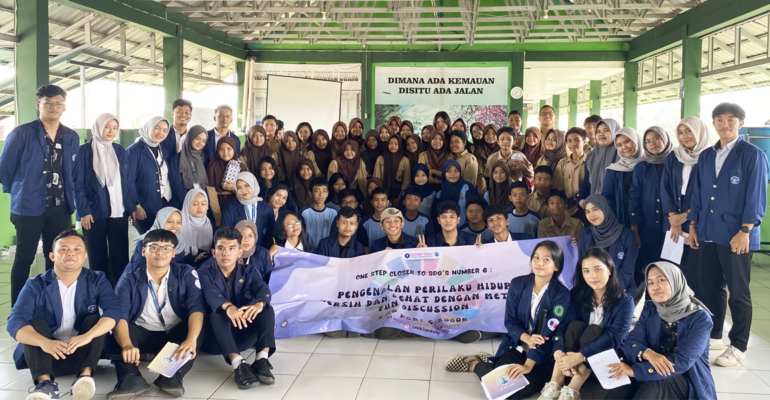Vocational School Students at IPB University Conduct Health and Clean Living (PHBS) Socialization for Students at SMP PGRI 6 Kota Bogor

Students from the Environmental Engineering and Management Study Program at IPB University’s Vocational School carried out a community service activity with the theme ‘One Step Closer to SDGs Number 6: Introduction to Clean and Healthy Living (PHBS) Using the Fun Discussion Method.’ The activity took place at SMP PGRI 6 Kota Bogor.
“This community service activity was attended by 31 students from the Vocational School at IPB University with the main target being 54 eighth-grade students at SMP PGRI 6 Kota Bogor,” said Graciella Hosiana, the project leader.
She explained that the introduction to PHBS was based on the Sustainable Development Goals (SDGs), specifically SDG 6 regarding access to clean water and sanitation. The implementation of SDG 6 in schools can be achieved by washing hands with flowing water and using soap.
Not only that, but consuming healthy snacks in the school cafeteria, maintaining toilet cleanliness, regular and measured exercise, proper waste disposal, eradicating mosquito larvae, and not smoking are also some indicators of the implementation of SDG 6 in schools.
“The selection of this topic aims to create a clean and healthy school environment sustainably. This program is also expected to improve the quality of learning, provide a deeper understanding of the importance of maintaining PHBS to prevent the spread of diseases,” explained Graciella.
Moreover, these efforts are not only preventive measures against diseases but also contribute to character formation and the overall well-being of students.
She mentioned that this community service activity used the Fun Discussion method. The delivery of material was done through enjoyable discussions to explore two-way discussion topics.
“Participants are allowed to ask questions after the material presentation. In addition, it is also interspersed with games to measure the extent to which students understand and absorb the inform9ation provided in a more enjoyable way,” she added.
Graciella stated that the results of this activity are evident in the change in student behavior and the enthusiasm shown. After the socialization, students are now more aware of the importance of personal hygiene.
“It is hoped that the implementation of this community service can instill positive habits among students, not only at school but also in their surrounding environment,” she said. (*/Rz) (IAAS/Hap)



